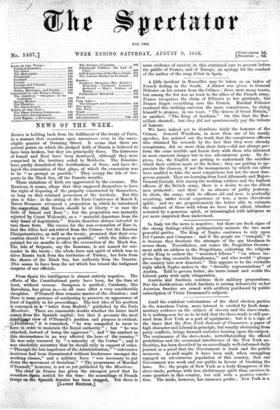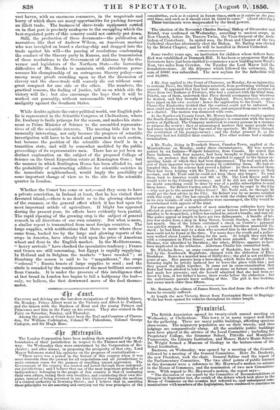Amid the confident vaticinations of the chief election parties in
the American Union, more interest is excited by fresh documentary evidence on the subject of slavery and the slave-trade. It is nothing new for us to be told that the slave-trade is still pursued from New York as a port of equipment ; but it is a sign of the times that the New York Journal of Commerce, a paper of high character and Liberal in principle, but usually abstaining from party conflicts, brings forward statistics bearing upon the subject. The continuance of the slave-trade, notwithstanding the official prohibition and the occasional interference of the New York authorities, has been described by an exceedingly well-informed daily journal as a proof that the Government is weak and the publics insincere. As well might it have been said, when smuggling engaged an adventurous population of this country, that our Government was weak and our public in favour of breaking the laws. No; the people of New York as a body disapprove of the slave-trade, perhaps with less abolitionary spirit than survives in some quarters in this country, but still with a positive conviction. The trade, however, has immense profits ; New York is a
vast haven, with an enormous commerce, in the magnitude and hurry of which there are many. opportunities fox pushing forward an illicit trade. The business bf slave-trade equipment carried on in that port is precisely analogous to the smuggling which the best-regulated ports of this country could not entiiely put down.
Still, the production of these documents—the publication of narratives like that of Andrew Wilson, an American mariner who was inveigled on board a slaving-ship and dragged into the trade against his will—the passing of resolutions condemning the conduct of the Slavery party in Kansas, and the transmission of those resolutions to the Government of Alabama by the Governor and legislators of the Northern State—the increasing difficulties of Mr. Brooks to maintain with chivalrous perseverance his championship of an outrageous Slavery policy—are among many proofs crowding upon us that the discussion of slavery and the slave-trade will scarcely die out without some great conquest for one side or the other. The numbers, the practical reasons, the feeling of justice, tell us on which side the victory will lie ; but also encourage the hope that it will be worked out peaceably, without unreasonable triumph or vulgar malignity against the Southern States.

























 Previous page
Previous page